AI, Data, and IoT Dominate Business Priorities
New report emphasizes the importance of implementing strong data practices to adopt advanced technologies.
Topics
News
- Deloitte and AWS Forge $1 Billion Alliance to Accelerate Digital Transformation in the Middle East
- Over 40% of Agentic AI Projects Expected to Fail by 2027, Report Finds
- Guardian AI Agents Poised to Take 15% of Agentic AI Market by 2030, Gartner Says
- Deloitte Rolls Out Global Agentic Network to Accelerate AI Adoption in the Middle East
- AI Research Forum and Summit Focused on Agentic AI Announced
- Cisco's New Quantum Entanglement Chip Aims to Accelerate Distributed Computing

[Source photo: Krishna Prasad/Fast Company Middle East]
Organizations are open to emerging technologies, but economic conditions push them to consider technologies with immediate benefits and potential future expansion.
According to the Endava Emerging Tech Unpacked 2024 report, organizational priorities include artificial intelligence (AI) and generative AI (GenAI), big data, predictive analysis, and IoT.
The report emphasizes the importance of implementing strong data practices to adopt advanced technologies. While each industry faces unique challenges, the common thread is the need for high-quality data to support AI, predictive analytics, and IoT implementations. Businesses must prioritize data infrastructure and management to successfully integrate new technologies and remain competitive.
According to the report, data serves as the foundation: it’s used in training AI models, is crucial for accurate predictive data and is exchanged among IoT devices to empower decision-making. While organizations have different choices for what to invest in, many efforts will start with prioritizing data infrastructure and management.
Here are the key findings:
The Dominance of Data
Big data and predictive analytics are critical technologies for modern businesses. Ranked third and fourth in priority, these technologies are indispensable for organizations seeking to leverage quality data for insightful decision-making. As data becomes increasingly integral to operations, its management and analysis are more crucial than ever.
AI Takes Center Stage
AI and its subset, generative AI, are at the forefront of technological adoption. According to the report, nearly half of the surveyed organizations ranked AI among their top three priorities.
This is no surprise, given AI’s proven ability to enhance productivity and efficiency while providing a competitive edge. Despite its promise, the path to widespread AI implementation is not without hurdles, including regulatory challenges and potentially high costs.
Skepticism Surrounds the Metaverse
While awareness of the metaverse remains high, skepticism about its practical business applications persists. The report notes that many organizations remain cautious despite significant investments and high-profile product launches, such as Apple’s Vision Pro. Whether the metaverse will meet its lofty expectations remains an open question.
IoT’s Growing Importance
The Internet of Things (IoT) continues to garner interest, ranking fifth among priorities. Despite being less buzzworthy than newer technologies, IoT’s practical applications in supply chain visibility and equipment monitoring make it a staple for many businesses. According to the report, 40% of respondents already use IoT in some capacity.
Quantum Computing
Quantum computing, though still in its infancy, holds the potential to revolutionize industries by solving complex problems at unprecedented speeds. Despite its transformative potential, quantum computing ranked lower in familiarity and relevance due to its current technological limitations and high power requirements.
Industry-Specific Impacts
Banking
In the banking sector, generative AI, machine learning, and predictive analytics are transforming operations. These technologies are being deployed to automate tasks, enhance customer interactions, and improve decision-making processes. Open banking and API ecosystems are also critical for developing innovative services.
Healthcare
Healthcare is leveraging AI and digital twin technology to improve patient care and operational efficiency. Electronic health records (EHRs) and AI-driven diagnostics are becoming standard, while digital twins offer new ways to model and optimize healthcare systems.
Retail
Retailers are integrating technologies like RFID, electronic shelf labelling (ESL), and AI to digitise brick-and-mortar stores and personalise shopping experiences. Sustainability is also a key focus, driven by consumer demand and environmental considerations.
Supply Chain
Big data, predictive analytics, and AI enhance the supply chain sector’s data quality and operational efficiency. Machine vision and automation are improving safety and streamlining processes, though data silos and legacy systems remain challenges.





